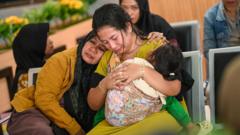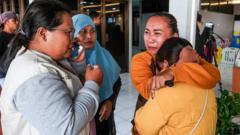Authorities in Indonesia have arrested 13 individuals connected to a baby trafficking ring believed to have sold at least 25 infants to Singapore since early 2023. The operation involved targeting vulnerable mothers and includes complex networks for document forging and transportation.
Indonesian Police Unravel Major Baby Trafficking Syndicate

Indonesian Police Unravel Major Baby Trafficking Syndicate
A significant international baby trafficking operation has been dismantled in Indonesia, leading to multiple arrests and the rescue of infants sold to buyers in Singapore.
Indonesian police have made a significant breakthrough in combating human trafficking by uncovering an elaborate syndicate involved in baby trafficking. According to reports, the operation has seen the sale of at least 25 infants to buyers in Singapore since the beginning of 2023. This week, police conducted raids in the cities of Pontianak and Tangerang, leading to the arrest of 13 suspects and the rescue of six babies, all approximately one year old, who were poised for trafficking.
Surawan, the director of general criminal investigations for the West Java Police, detailed the syndicate's operations, informing the BBC that the infants were housed initially in Pontianak, where their immigration documents were prepared before their illicit transport to Singapore. This trafficking network allegedly targeted parents, especially expectant mothers, who were unwilling or unable to care for their children, often engaging in communications via Facebook and later transitioning to more private messaging platforms like WhatsApp.
"Some babies were even reserved while still in the womb," noted Surawan. Once born, the syndicate covered delivery costs and provided monetary compensation to the biological parents before taking custody of the infants. Investigators revealed that these individuals were involved in various roles within the syndicate, including recruiters who sought out vulnerable mothers, caretakers responsible for the children, and those who fabricated paperwork necessary for the infants’ citizenship.
The sale of these infants ranged between 11 million to 16 million Indonesian rupiah, approximately $673 to $1,060. Recent inquiries have determined that at least 12 male and 13 female babies were sold, coming from various locations within West Java. The police’s immediate focus is to track down the adopters in Singapore, as they aim to cross-reference the data of those who received the infants from the syndicate.
Surawan emphasized that the parents’ agreement to surrender their infants negated the premise of kidnapping, suggesting the potential motivations rooted in financial hardship, which could also implicate them in legal offenses related to child trafficking laws.
Police are actively seeking collaboration from Interpol and authorities in Singapore to locate any remaining members of the syndicate and the buyers involved. Additionally, there is concern that parents may face legal consequences for their roles if it is determined they willingly participated in the sale due to desperation.
Child trafficking experts, such as Ai Rahmayanti from the Indonesian Child Protection Commission, indicate that these syndicates often exploit women in vulnerable situations such as unplanned pregnancies or abandonment, capitalizing on their distress by posing as legitimate care facilities. Many women are misled into believing they are partaking in a compassionate adoption process.
The alarming trend of child trafficking in Indonesia is underscored by rising statistics from the KPAI. In 2020, there were 11 reported illegal adoption cases, which skyrocketed to 59 incidents in 2023, highlighting the growing severity of the issue. Cases of trafficking disguised as illegal adoption have proliferated across different regions, indicating the need for increased vigilance and intervention.
As the investigation continues, the situation raises urgent questions about the protections in place for vulnerable parents and infants, with authorities working tirelessly to dismantle these trafficking networks that hide in plain sight.



















